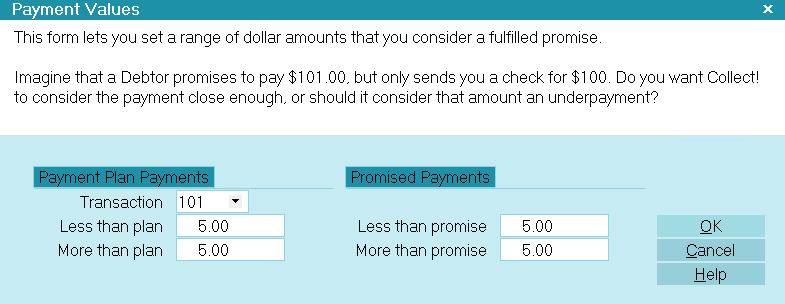Payment Values
This form lets you set a range of dollar amounts that you
consider a fulfilled promise.
Imagine that a Debtor promises to pay $101.00, but only sends you
a check for $100. Do you want Collect! to consider the payment
close enough, or should it consider that amount an underpayment?
In the Payment Values form, you can set the dollar ranges that
are considered full payment. The amounts you enter are linked
to the way you asked Collect! to manage your promised payments.
You can set different contact plans to run for full payments,
underpayments and overpayments. The contact plans to run are
chosen in the Payment Posting Options form but the values that
trigger running the plans are entered in the Payment Values form.

Payment Values
Words Of Caution
***
Please be aware that conflicting messages sent to Collect! regarding
contact plans can cause unexpected results or write erroneous data
to your database. When you set values in the Payment Values form,
take care not to create conflicting values in a any of your transaction
types or contact plan events. The best approach is to keep your
procedures simple and be sure of each process that you are creating
or calling through transaction types, contact plans and default settings.
***

Plans And Promises
Notice that you can set different ranges for payment plans and
for promise contacts. This is because payment plans are exact,
and payments should be very close to the planned amounts,
while promise contacts can be far more vague.
 Collect! clearly differentiates between promise contacts
and promised transactions. Promise transactions are
created using a Payment Plan, while promise contacts
are available using contact plans.
Collect! clearly differentiates between promise contacts
and promised transactions. Promise transactions are
created using a Payment Plan, while promise contacts
are available using contact plans.

Less Than Plan
Enter an amount in this field that the Debtor
is allowed to be under the promised amount.
For example, enter 1.00 here, and if they have
a promise due for $100.00 the Debtor can send
a payment for $99.00 and it is still considered a
fulfilled promise. However, even if they send $98.99,
the payment is considered an underpayment,
and the Underpayment Contact Plan will be called.
This is for promised transactions, as scheduled in a
Payment Plan for this Debtor. Promise transactions
have a payment date but no posted date.

More Than Plan
Enter an amount in this field that the Debtor is
allowed to be over the promised amount.
For example, enter 1.00 here, and if they have a
promise due for $100.00 the Debtor can send a
payment for $101.00 and it is still considered a
fulfilled promise. However, even if they send $101.01,
the payment is considered an overpayment, and
the Overpayment Contact Plan will be called.
This is for promised transactions as scheduled in a
Payment Plan for this Debtor. Promise transactions
have a payment date but no posted date.

Less Than Promise
Enter an amount in this field that the Debtor is allowed
to be under the promised amount.
For example, enter 1.00 here, and if they have a
promise due for $100.00 the Debtor can send a
payment for $99.00 and it is still considered a
fulfilled promise. However, even if they send $98.99,
the payment is considered an underpayment, and
the Underpayment Contact Plan will be called.
This is for Promise contacts as created manually
or by using contact plans.

Transaction
Choose the Transaction Type to be posted for
promised payments.
The ID and Description of the transaction type will
be copied into the promise transaction when you
post promises.
To set details for any transaction type, select System
from the top menu bar and then select Financial Settings,
Transaction Types.
 Please examine the details of the
Transaction Type that you choose. Does it
contain any settings that conflict with your
value and posting settings?
Please examine the details of the
Transaction Type that you choose. Does it
contain any settings that conflict with your
value and posting settings?

More Than Promise
Enter an amount that the Debtor's payment can
be over the promised amount.
For example, enter 1.00 here, and if they have a
promise due for $100.00 the Debtor can send a
payment for $101.00 and it is still considered a
fulfilled promise. However, even if they send $101.01,
the payment is considered an overpayment, and the
Overpayment Contact Plan will be called.
This is for Promise contacts as created manually
or using contact plans.

Help
Press this button for help on the Payment Values
dialog and links to related topics.

Cancel
Select this button to ignore any changes you may
have made and then return to the previous form.

OK
Selecting this button will save any data you have
entered and return you to the previous form.

| 
Was this page helpful? Do you have any comments on this document? Can we make it better? If so how may we improve this page.
Please click this link to send us your comments: helpinfo@collect.org